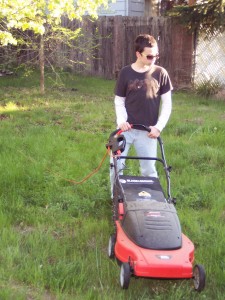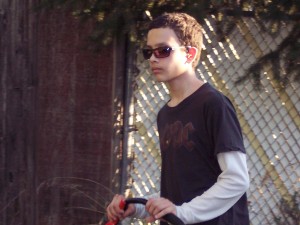Nigel recently accompanied me to a large, busy grocery store, a smorgasbord of sensory issue hell. In recent years, I haven’t thought about it much – we just go and do our thing. We come home, Nigel helps bring in the bags from the car, I unpack. Seeing us now, one would never guess that, years ago, going to the grocery store with my son was not such an easy task. In fact, it was a nightmare.
He was about a month old when I first took him to the grocery store with me. “Wow,” I thought as he slept on my chest. “He’s loving this.” Within eighteen months, that was not the case. The baby who slept on my chest became the toddler who screamed and writhed on the floor. After a few of those incidents, I decided to leave him home with his dad when I went grocery shopping. Of course, that was not always possible. Once I had to run out for a few essentials and had Aidan on my hip and Nigel pulling on my arm. Nigel was about three years old. The sounds and the lights tortured him. I quickly grabbed the few things I needed and went up to the check stand, thankful that there was only one person ahead of us. Suddenly, someone in the customer service booth right next to us turned on an electric coffee grinder. Nigel began shrieking and sobbing and trying to bolt. It was horrible. Of course, Aidan joined in. Somehow I managed to keep Nigel from running away. Shaking, with both kids still crying, I paid for our items, and we emotionally limped back to the car.
I did not take him in any more stores for several years after that. His dad and I were divorced, but for a while he still lived in our area, and he would have the boys two nights a week, so I did grocery shopping then. When Nigel was seven, his dad moved 700 miles away, but fortunately I had a boyfriend then who would stay with the boys while I ran my errands. That lasted until five years ago, when Nigel was nine. At that point, he could actually sit for a while in a restaurant, so I figured I could try taking him to the store again. I had to, because there was no one to stay home with him.
I was nervous, remembering all the screaming and writhing on the floor. And I was nervous because I didn’t know what my options were if it was still going to happen. We prepared using a homemade social story about going to the grocery store. I made rules, such as “hold onto the cart and stay with Mom.” And I promised rewards. If you are quiet in the store and stay with Mom, you can pick out a treat. And you know what? The planets aligned and Nigel did okay. He covered his ears a lot, but at least he knew to do that. It took him a few years to learn how.
About a year ago I decided that if I put on a movie for him that I could leave Nigel and Aidan home alone for an hour while I ran errands. My cell number was posted by the phone, and we practiced them calling me or a neighbor if anything happened. And I got used to them not going to grocery stores with me most of the time.
Last week, Nigel came with me because he had a gift card to use at a different store that was nearby. First we went to the grocery store. As Nigel calmly walked beside me through the entrance, I was suddenly thrown back to the days of sensory issue hell. It struck me how vastly different it is for him now. I have read about autistic adults who have vivid memories of their childhood and how agonizing their sensory issues were, and I wondered if Nigel remembered those old grocery store experiences. I described for him how he had been, reminded him of the time with the coffee grinder, and gently asked him if he remembered any of that.
“No,” he said. “I don’t remember.” He even sounded a little surprised.
Part of me wonders if it’s a case of him subconsciously blocking those memories because they were so traumatic, which is something that members of our family are known to do. Or maybe he just cannot access memories from before he was verbal. I know that I can’t remember anything before I started talking. In a way, I wish Nigel could remember his early years because I would love to hear his perspective on them now. That would be simply amazing. But it’s probably good that he can’t remember those painful times, for his sake. It’s enough that I remember them and can feel so fortunate that somehow he learned to filter the bombardment of sensory input, and now he can participate in so much more of our life. Even if it’s just a trip to the grocery store.



